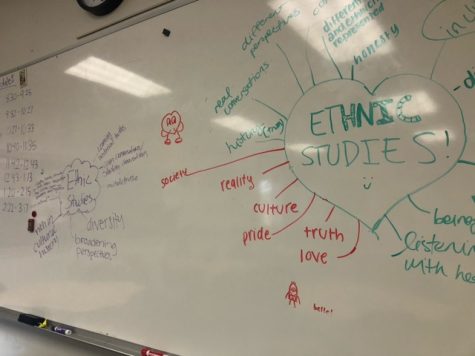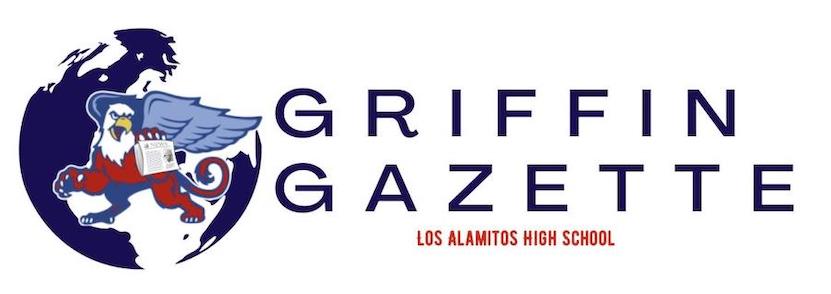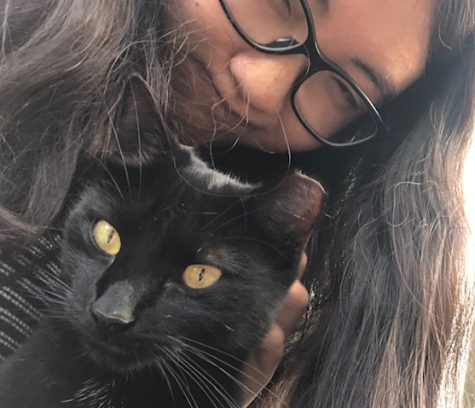Class Spotlight: Ethnic Studies
Last year’s Ethnic Studies students’ inspiring womyn in history wall
September 7, 2022
LOS ALAMITOS, CA — Los Alamitos High School offers a variety of classes to students. Let’s take a deep dive into some of the less populated classes on campus and explore what makes them great. This week’s focus is Los Al’s Ethnic Studies class, which was implemented at Los Alamitos High at the beginning of the 2021-2022 school year as an optional elective.
What is Ethnic Studies?
Ms. Cynthia Aviña, the class’ teacher, shares what is taught in the Ethnic Studies course. She explains that at the baseline, her students learn about “the history of race, racism, and other systems of oppression in the United States” and how they connect to today’s context. However, Ms. Aviña makes it clear that the class is not all history and textbooks, “We teach racial, cultural, and ethnic literacy.” She feels it is important to be literate with different experiences in order to strengthen compassion and understanding.

Along with ethnic history and literacy, students are also taught about empathy and community building. One thing that immediately stood out was their community agreements. Ms. Aviña and her students worked to create their own open set of community guidelines. Some key points of the list were showing support, having empathy, being present, and accepting others. When asked, students shared that working together to create community guidelines allowed the classroom to become a safe space for them that felt different from other classes they had been in. Ms. Aviña explains that in an Ethnic Studies class, everyone brings their own perspective to discussions, so it is important to set the groundwork for people to approach class conversations in a connective, empathetic way.
“[The community agreements are] what [the students] think they need in order for their space to feel safe for them,” Ms. Aviña said. “It’s their space as much as it is mine.” In addition to this, several Ethnic Studies students admit that they took the class because they are not typically taught about minorities in their regular, mandatory classes.
“I want to learn about different cultures, different people, different things. I want to learn history through the eyes of all people,” Natalie Hill, senior, said.
Charlize Fan, a junior, shared in this sentiment, stating, “I want to learn about stories of ethnic people from a non-sugar coated point of view.”
In addition to Hill, several students wanted to enroll in the class in order to gain insight into their own culture that is not discussed in a typical history class. For example, student Marissa Zaragoza explained that she took the course in order to learn more about her Mexican roots. Similarly, her classmate Josh Dixon contributed that he was interested in discovering more about his history, background, and family.
So why should you take Ethnic Studies?
Mr. Mossy Kennedy, one of the Los Al teachers who was heavily involved in the process of instating the class, believes that Ethnic Studies is an incredible course for students to have available to them. When asked why Ethnic Studies is important, Mr. Kennedy discussed:
Similarly, Ethnic Studies student, Victoria Aspurez, expanded on this idea of its originality and unique curriculum: “It’s different from any other class offered here. I’ve never been taught about this stuff before.”
How can you support Ethnic Studies?
After observation, it was clear that Ethnic Studies is much more than just a history class. Through a common interest in learning about a variety of cultures, Ms. Aviña and her students have created a comfortable, unified community in which everyone supports and listens to each other.
For students interested in educating themselves on cultures that aren’t typically represented or even interested in learning more about their own identity, Ethnic Study is an amazing course that fosters a secure sense of belonging. If you do not have room for Ethnic Studies in your schedule, Ms. Aviña is head of an Ethnic Studies club available to all students. If you simply want to support Ethnic Studies, the class is currently working to create fundraising opportunities for their activities. Be sure to look out for more information on how to give to this insightful course, and remember that you are always welcome to learn more about your culture and others’ cultures through Ethnic Studies.







Eleazar • Jul 5, 2023 at 11:47 pm
Awesome profile on great teachers and important class. These classes help students develop critical thinking, increase civic engagement and inspire young people to attend college. Why is this controversial?
lfranzen • Sep 11, 2022 at 4:49 pm
Alicia, I love that you chose to focus on Ethnic Studies. As it will be a high school graduation requirement in just a few years, I appreciate this look into how it is developing. I love how you explored the process by which this class came into being and the impact it is having on students.